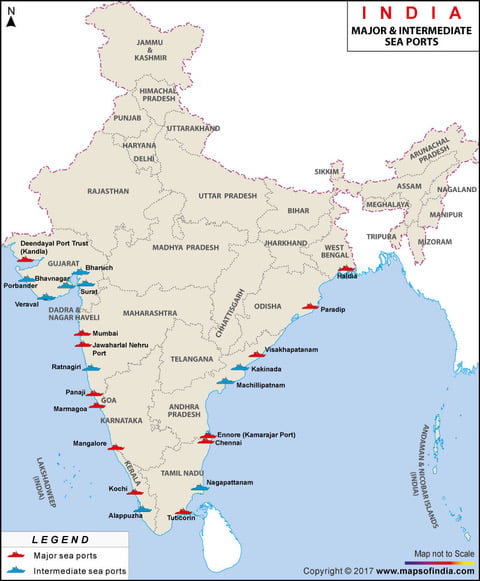UPSC Articles
ECONOMY/ GOVERNANCE
Topic:
- GS-3: Indian Economy and issues relating to planning, mobilization, of resources, growth, development and employment; Infrastructure: Ports
- GS-2: Government policies and interventions for development in various sectors and issues arising out of their design and implementation.
Major Port Authorities Bill, 2020
Context: Parliament has passed landmark Major Port Authorities Bill,2020
The Bill seeks to provide for regulation, operation and planning of major ports in India and provide greater autonomy to these ports. It seeks to replace the Major Port Trusts Act, 1963.

Key features of the Bill include:
- Application of Act: The Bill will apply to 12 major ports — Deendayal (erstwhile Kandla), Mumbai, JNPT, Marmugao, New Mangalore, Cochin, Chennai, Kamarajar (earlier Ennore), V O Chidambarnar, Visakhapatnam, Paradip and Kolkata (including Haldia). These together had handled 705 million tonnes (MT) of cargo in 2019-20.
- Major Port Authorities Board: The Bill provides for the creation of a Board of Major Port Authority for each major port. These Boards will replace the existing Port Trusts.
- Composition of Board: It will comprise of a Chairperson and a deputy Chairperson, both of whom will be appointed by the central government on the recommendation of a selection committee. Board will include one member each from state government, Railway & Defence Ministry and Customs department. Additionally, 2-4 independent members and two members representing interest of employees of Port authority will be part of Board.
- Powers of the Port Board: The Bill allows the Board to use its property, assets and funds as deemed fit for the development of the major port. To meet its capital and working expenditure requirements, the Board may raise loans from banks, financial institutions and from abroad.
- Autonomy to Board: They have been delegated full powers to enter into contracts, planning and development, fixing of tariff except in national interest, security and emergency arising out of inaction and default. In the present MPT Act, 1963 prior approval of the Central Government was required in 22 instances.
- Push to Public Private Partnership (PPP) projects: The Bill defines PPP projects as projects taken up through a concession contract by the Board. For such projects, the Board may fix the tariff for the initial bidding purposes but the appointed concessionaire will be free to fix the actual tariffs based on market conditions
- Corporate Social Responsibility: The Bill provides that the Board may use its funds for providing social benefits. This includes development of infrastructure in areas such as education, health, housing, and skill development.
- Adjudicatory Board: The Bill provides for the constitution of an Adjudicatory Board by the central government. This Board will replace the existing Tariff Authority for Major Ports(TAMP) constituted under the 1963 Act. This Board look into disputes between ports and PPP concessionaires and also reviews stressed PPP projects
Significance of the Bill
- Similar to Global Institutional Structure: It modernises the institutional structure of these ports. The bill reorients the governance model in central ports to landlord port model in line with the successful global practice
- Decentralisation: The bill aims at decentralizing decision making and to infuse professionalism in governance of major ports.
- Transparency: It imparts faster and transparent decision making benefiting the stakeholders and better project execution capability.
- Compact Board: A simplified composition of the Board of Port Authority will comprise of 11 to 13 Members representing various interests (earlier 17 to 19 Members). A compact Board with professional independent Members will strengthen decision making and strategic planning.
- Boost to Port Sector: This will empower the Major Ports to perform with greater efficiency on account of full autonomy in decision making which in turn promotes the expansion of port infrastructure and facilitate trade and commerce. It ensures optimum utilisation of the coastal line in the country through competitive ports.
- Not Privatisation: The new Act is not intended to privatise major ports but aimed at boosting their decision-making powers in order to compete with private ports. It is seen as the first step in the corporatisation of Ports and then enabling them to list on stock exchange
Connecting the dots:
- Corporatisation of Ordnance Factory Board











